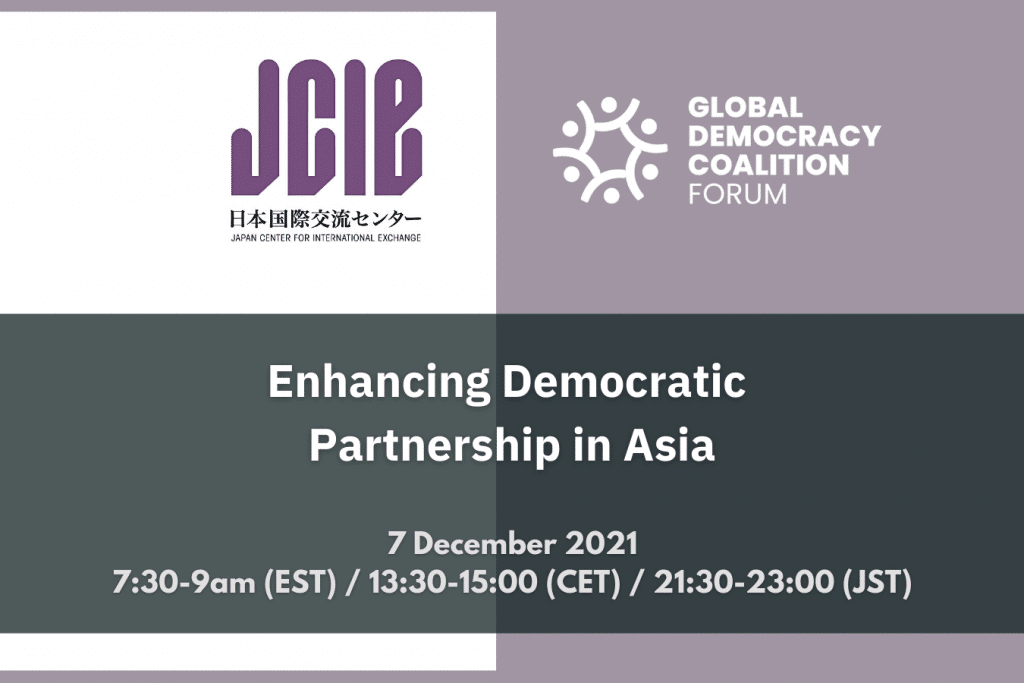In the lead-up to President Biden’s Summit for Democracy, JCIE organized a webinar on December 7 that convened over 40 Asia-Pacific experts to discuss how to enhance democratic partnership in the region. The event was held as part of the International IDEA’s Global Democracy Coalition Forum to bring more diverse voices into the Summit conversation and featured speakers from Japan, the United States, India, Indonesia, the Philippines, and South Korea. The forum itself featured 41 webinars organized by 47 democracy organizations around the world.
Participants acknowledged the serious challenges to democracy in the region during the COVID-19 pandemic, as evidenced in Myanmar, Hong Kong, Xinjiang, and Afghanistan, and it was noted that while Taiwan’s inclusion in the US-led Summit for Democracy is a positive development, only four ASEAN countries are participating. The discussion also addressed the ability of technology and big data to both undermine or strengthen democratic institutions. Rather than taking an antagonistic approach against non-democracies, participants underscored the importance of Asian democracies uniting and demonstrating that they can deliver and work better for their people, and to conduct “checks-and-balances” for one another instead of letting non-democratic countries take advantage of their failures, as has been the challenge in Afghanistan.
To promote greater solidarity, participants examined the need for effective regional mechanisms and the powerful role that civil society and the media can play, and highlighted the role of major democracies, including Japan, in leading the regional approach and civil society engagement.
The discussion produced the following recommendations, which were handed to the Summit organizers on December 8. For the full text of the recommendations please click the button below:
Recognizing that a decline in democracy is partly due to failures to meet the needs of people in democratic countries, participants pointed to the need to demonstrate that democracy can deliver better and to realize a more equitable and inclusive development. The system of global governance should be also more democratic. More specifically:
- Regional democracies must strengthen their partnership and framework for cooperation at the government and CSO level. Existing regional mechanisms could be reviewed to make them more effective and coordinated. Areas for partnership will include promoting inclusive development, good governance, social fabric, transparent infrastructure, anti-corruption, digital technology, the pandemic, and climate change.
- A vibrant civic space and independent media are indispensable to ensure a transparent and accountable government. Additional mechanisms should be developed to extend stronger support to CSOs and independent media in Asia.
- In view of cultural and historical diversity, the importance of Asian ownership cannot be overemphasized. In this regard, Japan and the ROK can play a leadership role in promoting regional democratic partnership. The regional democracies may commit themselves to strengthen their support for democratization efforts including those of CSOs and media.
For the full text of the recommendations as well as to watch the video please click the links below. To learn more about the event in Japanese click here.
PARTICIPANTS
Moderator: Yukio Takasu, Chair, JCIE Future of Democracy Study Project; Special Advisor to the UN Secretary General on Human Security; former Japanese Ambassador to the United Nations
DISCUSSION PANEL
Yamini Aiyar, President and Chief Executive, Centre for Policy Research, India
Edna Estifania A. Co, Full Professor and former Dean of the National College of Public Administration and Governance, University of the Philippines
I Ketut Putra Erawan, Executive Director of Institute for Peace and Democracy (IPD), Bali, Indonesia
Maiko ICHIHARA, Associate Professor, the Graduate School of Law and the School of International and Public Policy, Hitotsubashi University
Hun Joon Kim, Professor, Department of Political Science, Korea University
DISCUSSANTS
Leena Rikkilla Tamang, Director for the Asia and the Pacific Region International IDEA
Manpreet Singh Anand, Regional Director for Asia-Pacific, NDI



